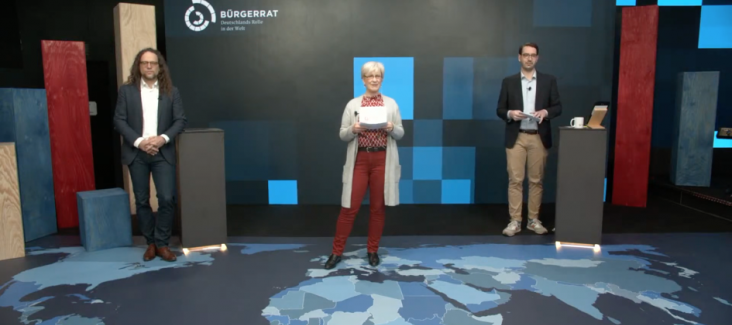The Citizens' Assembly on "Germany's Role in the World" is the second Citizens' Assembly in Germany to take place at the federal level. In contrast to its predecessor, the Citizens' Assembly on Democracy, this one will take place online due to the current critical pandemic situation and the nationwide lockdown regulations. The Citizens' Assembly is organised by Mehr Demokratie e.V. in cooperation with the initiative Es geht LOS! and other partners responsible for the implementation of the format, such as ifok GmbH, the IPG Oldenburg and the nexus institute.
In the ten online sessions, participants discussed five different pre-defined topics: Sustainable Development, Economy and Action, EU Foreign Policy, Peace and Security, Democracy and Rule of Law. The discussions took place both in small groups and in the Assembly as a whole. The participants were advised by experts from different fields. The aim of such a citizens' assembly is to enable the selected participants to discuss relevant political issues in order to jointly develop visions for the future and to work out a catalogue of recommendations. Following the citizens' assembly, these recommendations are to be presented to parliament in the form of a Citizens' Report.
The random selection procedure plays a special role in such a participation format. By drawing participants by lot, a diverse composition of the Citizens' Assembly was made possible, which should reflect the society of Germany as a whole. This so-called "mini-Germany" is composed of participants with different backgrounds in terms of characteristics such as gender, age, education and professional status, as well as migration background and place of residence. The diverse composition enables different perspectives to be included in the discussions and in the subsequent citizens' report in order to find as a result a consensus across society. Through the regular discussions and the exchange among each other, the participants are brought closer to political reality and even those who are not personally politically engaged are encouraged to critically engage with political issues.
Such political participation formats are playing an increasingly important role in political practice. Another example of such a format at the national level in Europe was the Irish Citizens Assembly in Ireland in 2016. The recommendations of this citizens' assembly led to three referendums on constitutional amendments, of which those on same-sex marriage and the ban on abortion were passed. Also in France, President Emmanuel Macron announced in January 2020 that there will be a referendum on the recommendations of the French Citizens' Convention on Climate "Convention Citoyenne pour le Climat", which took place from October 2019 to June 2020, and that the format of the Citizens' Assembly will be incorporated into French political practice at the national level as the third chamber of the Republic. One way of implementing such a participation format in political practice in cooperation with the parliament is also to be tested in the Citizens' Assembly on Germany's role in the world. After the official handover of the citizens' report based on the results of the Citizens' Assembly on 19 March 2021, the implementation phase will begin for the Bundestag. How German politics reacts to the proposals of such a citizens' assembly and to what extent this can be a meaningful form of political participation will then become clear.

